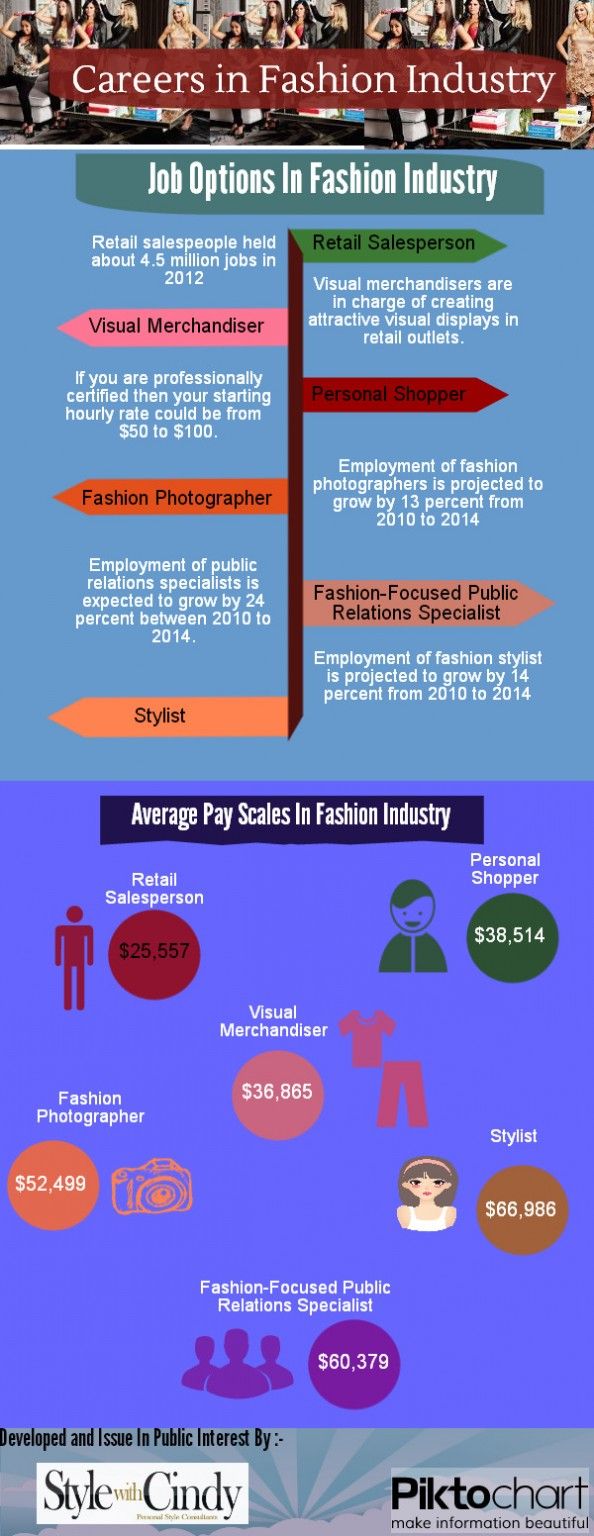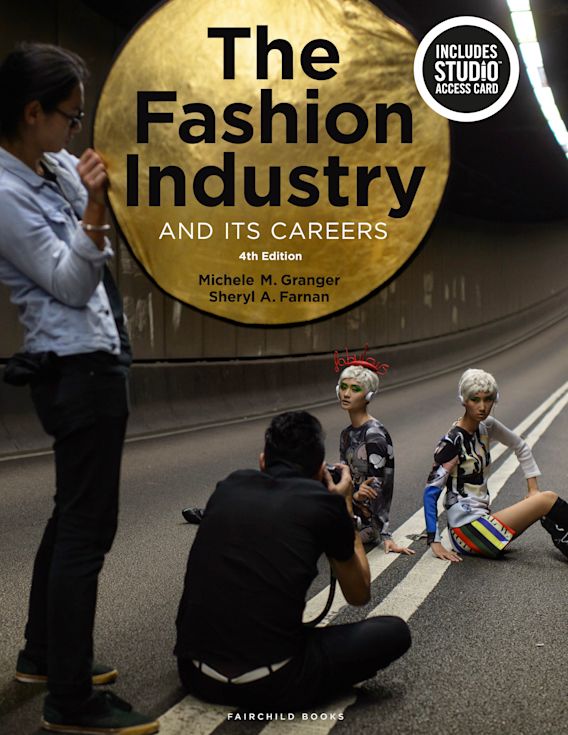A Comprehensive Guide to Careers in the Fashion Industry
Related Articles: A Comprehensive Guide to Careers in the Fashion Industry
Introduction
With great pleasure, we will explore the intriguing topic related to A Comprehensive Guide to Careers in the Fashion Industry. Let’s weave interesting information and offer fresh perspectives to the readers.
Table of Content
A Comprehensive Guide to Careers in the Fashion Industry

The fashion industry is a dynamic and multifaceted realm encompassing a vast array of professions. From the creative visionaries who design the trends to the skilled artisans who bring those designs to life, the industry offers a diverse range of career paths for individuals with a passion for style, innovation, and business acumen. This guide explores the various jobs offered within the fashion industry, providing insights into their roles, responsibilities, and potential career trajectories.
Creative Roles:
-
Fashion Designer: The cornerstone of the fashion industry, fashion designers are responsible for conceiving and developing new clothing, accessories, and footwear. They translate trends, materials, and technical considerations into aesthetically pleasing and functional garments. Fashion designers often specialize in specific areas such as womenswear, menswear, children’s wear, or haute couture.
-
Textile Designer: Textile designers focus on the development of fabrics and patterns used in fashion garments. They experiment with different fibers, weaves, prints, and embellishments to create unique and innovative textiles that meet the needs of designers and consumers.
-
Pattern Maker: Pattern makers translate fashion designs into precise technical specifications, creating patterns that are used to cut and sew garments. They possess a deep understanding of garment construction, draping, and pattern drafting techniques.
-
Fashion Stylist: Fashion stylists create visual narratives through clothing, accessories, and overall aesthetic. They work with photographers, models, and brands to curate looks for editorials, advertising campaigns, and runway shows.
-
Fashion Illustrator: Fashion illustrators translate fashion designs into visual representations through sketches, drawings, and digital artwork. They possess strong artistic skills and a keen eye for detail, capturing the essence of a garment’s design and its intended style.
Production and Manufacturing:
-
Fashion Buyer: Fashion buyers are responsible for selecting and purchasing merchandise for retail stores or online platforms. They research trends, analyze market data, and negotiate with suppliers to ensure a diverse and profitable inventory.
-
Merchandiser: Merchandisers manage the flow of products from design to distribution. They collaborate with designers, buyers, and production teams to ensure that garments are produced in the right quantities, at the right time, and meet consumer demand.
-
Production Manager: Production managers oversee the entire manufacturing process, from sourcing materials to quality control. They ensure that production runs efficiently and meets deadlines, while maintaining high standards of quality and sustainability.
-
Pattern Cutter: Pattern cutters translate pattern designs into precise templates for garment production. They use specialized software and tools to create and modify patterns, ensuring accuracy and consistency in garment construction.
-
Seamstress/Tailor: Seamstresses and tailors are skilled craftspeople who sew and assemble garments according to pattern specifications. They possess expertise in various sewing techniques and can adapt to different fabric types and construction methods.
Marketing and Communication:
-
Fashion Journalist: Fashion journalists report on trends, events, and personalities within the fashion industry. They write articles, reviews, and features for print and digital publications, providing insights and analysis for readers and industry professionals.
-
Fashion Editor: Fashion editors oversee the content and visual direction of fashion publications. They curate stories, select images, and collaborate with writers, photographers, and stylists to create compelling and informative content.
-
Fashion Public Relations Specialist: Fashion PR specialists manage the public image of fashion brands. They develop and execute communication strategies, organize events, and build relationships with media outlets and influencers.
-
Social Media Manager: Social media managers curate and manage brand presence across various platforms. They create engaging content, track performance metrics, and build online communities for fashion brands.
Other Important Roles:
-
Fashion Consultant: Fashion consultants provide expert advice on style, image, and personal branding. They work with individuals and businesses to develop a cohesive and impactful fashion strategy.
-
Fashion Photographer: Fashion photographers capture the beauty and artistry of clothing and accessories. They work with models, stylists, and designers to create compelling images for editorials, advertising campaigns, and lookbooks.
-
Fashion Blogger: Fashion bloggers share their personal style, fashion insights, and product reviews with a dedicated audience. They build a following through engaging content, social media presence, and collaborations with brands.
Benefits of a Career in Fashion:
-
Creativity and Expression: The fashion industry offers a platform for individuals to express their creativity and artistic vision. From designing garments to styling shoots, every role allows for innovation and self-expression.
-
Global Reach: The fashion industry is a global marketplace, offering opportunities to work with diverse cultures and collaborate on international projects.
-
Fast-Paced Environment: The fashion industry is constantly evolving, creating a dynamic and exciting environment where individuals can learn and adapt quickly.
-
Entrepreneurial Opportunities: The fashion industry offers numerous opportunities for entrepreneurs to launch their own brands, boutiques, or online stores.
FAQs about Jobs in the Fashion Industry:
-
Q: What qualifications are needed for a career in fashion?
- A: The required qualifications vary depending on the specific role. However, a strong foundation in fashion design, textiles, business, or communication is often essential. Formal education through fashion schools, design colleges, or business programs can provide valuable skills and knowledge.
-
Q: Is a degree necessary for a career in fashion?
- A: While a degree can be beneficial, it is not always mandatory. Portfolio development, internships, and relevant work experience can be equally valuable in demonstrating skills and passion for the industry.
-
Q: What are the salary expectations for fashion jobs?
- A: Salaries in the fashion industry vary widely depending on experience, location, and specific role. Entry-level positions typically offer lower salaries, while senior management and creative roles can command higher compensation.
-
Q: Is the fashion industry competitive?
- A: The fashion industry is highly competitive, particularly in major fashion hubs. However, with dedication, talent, and a strong network, individuals can carve out successful careers.
Tips for a Career in Fashion:
-
Develop a strong portfolio: Showcase your skills and creativity through a well-curated portfolio that reflects your design aesthetic and technical abilities.
-
Network with industry professionals: Attend industry events, connect with individuals on LinkedIn, and seek mentorship from experienced professionals.
-
Stay updated on trends: Keep abreast of current fashion trends, emerging technologies, and industry news to stay competitive.
-
Build a strong online presence: Create a professional website, blog, or social media profile to showcase your work and connect with potential employers.
-
Develop your business skills: Understand the fundamentals of fashion business, including marketing, merchandising, and financial management.
Conclusion:
The fashion industry offers a diverse range of career paths for individuals with a passion for creativity, style, and business. From designing garments to managing brands, there are numerous opportunities to contribute to the world of fashion. By pursuing relevant education, building a strong portfolio, and networking with industry professionals, individuals can embark on rewarding and fulfilling careers in this dynamic and ever-evolving industry.


:max_bytes(150000):strip_icc()/fashion-job-titles-2061525-edit-b381a69a5dc5465295faf5d7ebd7cc83.jpg)

![Your Career in the Fashion Industry [INFOGRAPHIC] - Infographic Plaza](http://infographicplaza.com/wp-content/uploads/Your-Career-in-the-Fashion-Industry-infographic.jpg)



Closure
Thus, we hope this article has provided valuable insights into A Comprehensive Guide to Careers in the Fashion Industry. We thank you for taking the time to read this article. See you in our next article!
